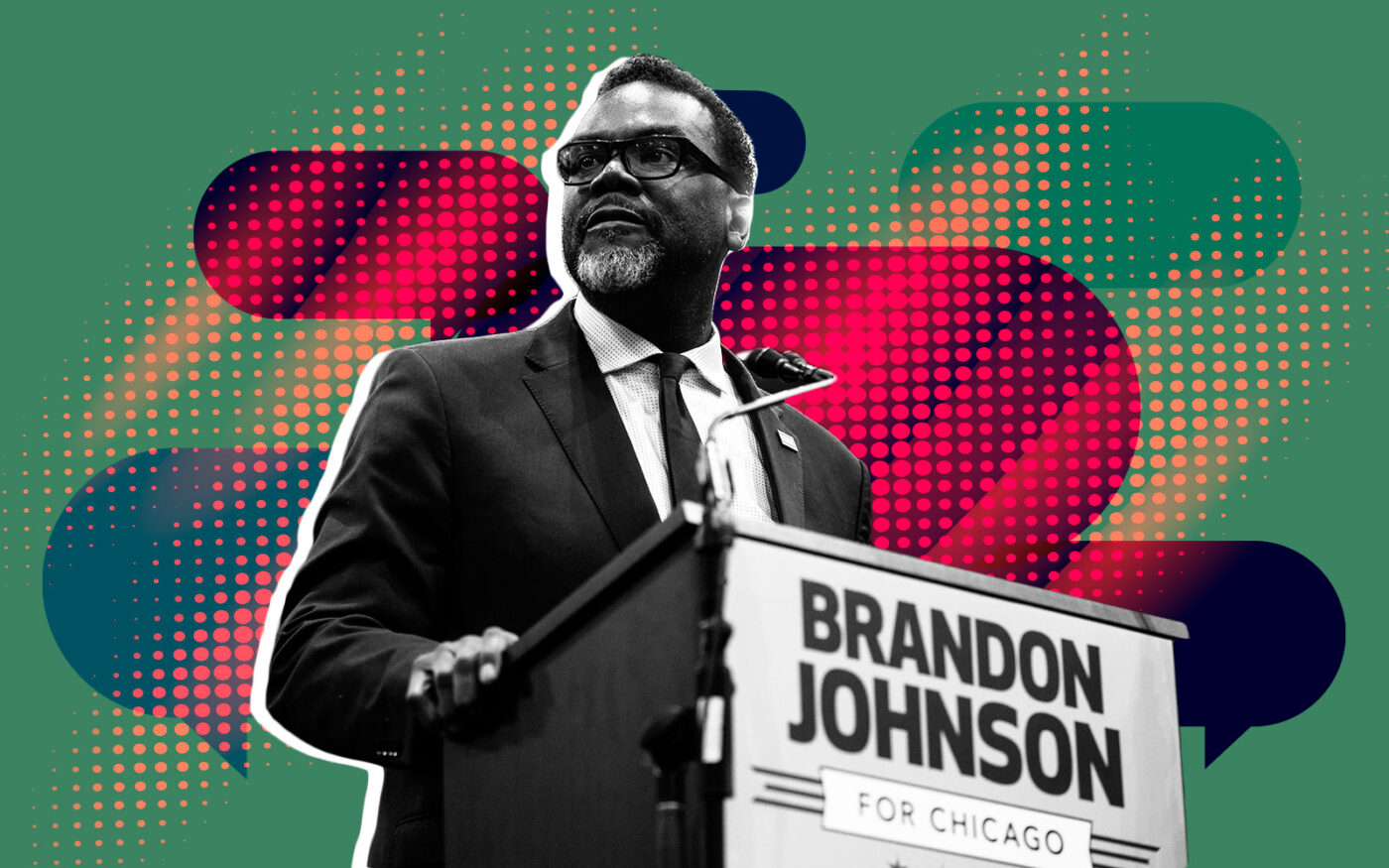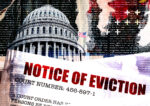 “No” votes leading on Mayor Brandon Johnson’s transfer tax referendum
“No” votes leading on Mayor Brandon Johnson’s transfer tax referendum
Trending
Real estate reacts to Johnson’s transfer tax trailing
Mayor appears set for a major political blow, as opponents of Bring Chicago Home referendum maintain lead

With the influence of Chicago’s commercial real estate sector, voters look poised to hand Mayor Brandon Johnson a big setback with the rejection of his signature campaign promise to raise the real estate transfer tax through a referendum, a ballot measure that was trailing by a solid margin as of Wednesday morning’s latest election tally.
Chicago real estate leaders who were vocal in their campaign against the measure were optimistic that “no” votes would hold their lead, as 53.7 percent of voters were against the policy, with 79 percent of votes counted, according to Associated Press estimates. The “yes” votes trailed by a little less than 23,000 ballots, as of 12:31 a.m.
Chicago’s strong showing against the transfer tax hike, called the Bring Chicago Home measure, could have national implications. It came as California voters prepare to decide in a November election that could repeal a massive transfer tax increase passed by voters in Los Angeles in 2022. It would also limit such duties from being imposed across the rest of the state, if passed.
Since taking effect, the Los Angeles measure has chilled high-end residential deals as well as commercial real estate sales, as higher rates kick in for all property sales of $5 million or more. Chicago real estate pros feared a similar outcome for the market if Johnson’s referendum had passed — it would have quadrupled the 0.75 percent transfer tax on property sales of $1.5 million or more to 3 percent of the sale price. It would have dropped the rate to 0.6 percent of the sale price for property sales of less than $1 million.
Unless the measure’s supporters pull off a miraculous comeback as the final votes are counted, its defeat would highlight the drop in Johnson’s approval rating since he took office last year. Just 21 percent of 500 registered Chicago voters approve of Johnson’s performance as mayor, according to a poll conducted for an education reform group that advocates for school choice, the Sun-Times reported in January.
Voters in the precincts in and surrounding downtown were solidly against the measure, as were voters in high-income and Latino wards on the Northwest Side. Progressive white neighborhoods near the lakefront on the North Side and Black neighborhoods on the South Side voted mostly for the measure, while Southwest Side voters came out against it, preliminary precinct-level data from the Chicago Board of Elections Commissioners showed.
Here’s what Chicago real estate leaders are saying about the transfer tax:
@properties Christie’s International Real Estate co-CEO Thad Wong: “The reality of the ‘mansion tax’ was that it wasn’t about mansions. Mansions was a way to name it something to get attention to attacks on the rich,” Wong said. He added the transfer tax proposal, which would have collected revenue dedicated to combating homelessness, was mostly a “commercial real estate tax at a time when commercial real estate is incredibly depressed.”
Wong said he thinks “no” voters understood this as they headed to the polls and that many of them want funding to address issues like homelessness, but do not want to have to pay more taxes to do so. He also thinks the State’s Attorney race drew out voters of this mindset who felt compelled to vote in support of O’Neill Burke over Harris, her more progressive opponent, for similar reasons.
“While everyone understands that there needs to be social programs, education and reform, I think everybody also understands that the number one way to combat poverty is through jobs and job creation,” Wong said. “And a lot of what the current administration is doing is damaging the city from being an attractive place to promote job creation, development and business by initiating more taxes and making it harder for people to generate a return on real estate.”
“My hope is that by this not passing, this current administration will begin to lean into business and start a constructive conversation with business owners in Chicago focused around growth and job creation, and bringing it back to Chicago that really attracted some world class businesses,” he said.
Colliers broker Alissa Adler, via LinkedIn: “Huge win for Chicago real estate. Now we can focus on solving the other headwinds and take at least one thing off the table.”
Kiser Group broker Andy Friedman: “Most of the country will not invest in Chicago because they do not have faith in the fiscal management of the city,” he said, adding that the lack of transparency around how revenues from the tax would be spent raised alarm bells. “(The referendum) said, ‘to throw money at one issue in the city, we are going to reach into the pockets of real estate owners.’ That sends the message, ‘don’t invest here.’’’
Turnout in the primary was lower than more recent election cycles, Board of Elections spokesman Max Bever said. As of Tuesday night, about 343,000 ballots had been counted, just surpassing a recent low-turnout primary, the 2012 election, which saw about 313,000 ballots cast in Cook County. With more mail-in ballots counting, that number will grow. However, the percentage of registered voters that turned out hovers around 20 percent.
Historically, city referendums have been rare and difficult to pass, Bever said. Although Chicago residents have voted on numerous non-binding referendums that are meant to gauge interest in a potential policy, they have rarely been asked to vote on a binding referendum like Bring Chicago Home, which would give the city authority to enact a new ordinance. The last time voters passed such a citywide measure was in 1885 when the Board of Elections was created via referendum.
While the transfer tax fight was the big question in the city, the business community also appeared to flex some muscle in candidate races that included suburban Cook County, as well.
Larry Rogers Jr., the CRE-favored incumbent Board of Review commissioner in charge of hearing property tax appeals cases who has clashed with Cook County Assessor Fritz Kaegi, cruised to re-election over challenger Larecia Tucker. And the real estate-backed State’s Attorney candidate Eileen O’Neill Burke held a slim lead over her opponent in the Democratic primary, Clayton Harris III, though the race was still too close to call Wednesday morning, at a 51-to-49 percent margin in favor of O’Neill Burke.
Here’s some more thoughts from Chicago real estate pros as well as supporters of the transfer tax:
Multifamily firm Peak Properties founder Mike Zucker: “A lot of properties sell for $1.5 million and up, from the local grocer to the local retail strip center or local industrial property, and this was going to have a major impact on those purchases and sales. … The transaction volume in the city of Chicago is already way down and this would have made it worse.”
Mayor Brandon Johnson: “The organizing doesn’t pivot; the organizing gets stronger,” the mayor told reporters Wednesday. “Because the same organizing that had to deal with the loss of schools, housing, mental health clinics (and) jobs is the same organizing that propelled me into this office. We get stronger, and whatever we didn’t get the first time we’ll get even more the next time.”
Building Owners and Managers Association: “We are grateful to everyone who spoke out against the constant real estate tax increases in our city. This massive tax increase would hurt homeowners, renters, union workers and businesses across Chicago.
“Homelessness is a critical problem, and all stakeholders must be at the table to solve it. We hope that both sides of this issue will be invited together to develop a detailed plan that provides genuine support to the homeless while bolstering our city’s competitiveness and protecting all the workers who depend on it.”
Bring Chicago Home advocates: “The Bring Chicago Home campaign exists in the long lineage of past and present struggles for fair housing, civil rights and economic justice,” supporters of the referendum said in a statement late Tuesday night. “While tonight’s election results are disappointing, we are nowhere near the end of our journey.
“There are still 100,000 outstanding mail-in ballots to be counted, but whatever the final count, one thing is abundantly clear tonight: how determined our opponents are to continue profiting from displacement and inequality,” their statement said. “From landlords sending intimidating emails to tenants, to a legal challenge attempting to invalidate the results, the realtors, corporate landlords, and mega-developers fought us at every turn.”
Neighborhood Building Owners Alliance President Michael Glasser: “While the results for this race may not be final, the passion of both sides is clear: we all want to make Chicago a better place to live.
“As neighborhood housing providers, we are responsible for 70 percent of the city’s affordable housing, and we want to work with the City to find real solutions that benefit neighborhood housing and grow Chicago’s supply of naturally occurring affordable housing,” Glasser said.
His organization joined the Building Owners and Managers Association and other real estate trade groups in a January lawsuit to try to block the transfer tax referendum from appearing on the ballot, which was ultimately unsuccessful.
Neighborhood Building Owners Alliance committee member Fionn McManigal: “Regardless of the outcome, it’s going to take everyone working together to move the needle on homelessness. If this tax increase ends up being rejected, it will still be hard to create and maintain affordable housing. If it passes, it will be really, really hard. Either way, meaningful solutions to affordable housing have to include housing providers.”
Read more
 “No” votes leading on Mayor Brandon Johnson’s transfer tax referendum
“No” votes leading on Mayor Brandon Johnson’s transfer tax referendum
 Incumbent CRE favorite wins rugged Board of Review race
Incumbent CRE favorite wins rugged Board of Review race
 Real estate-backed O’Neill Burke leading State’s Attorney race
Real estate-backed O’Neill Burke leading State’s Attorney race




